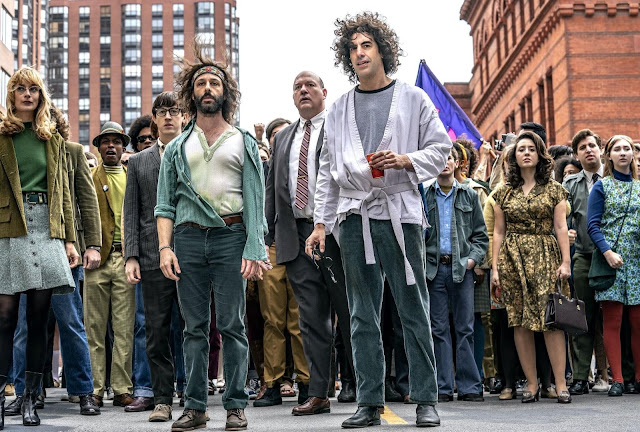By Tom Siebert
“The West Wing,” which ran from 1999 until 2006, was one of the most awarded and rewarding series in television history, known for its long shots of quick-speaking political aides walking with high-minded alacrity down the corridors of corruption––all in the service of a super-smart, bleeding-heart president.
Although set in modern America, when everyone seemed to collectively decide to dislike politicians, the TV show hearkened back to the 1960s, when the brothers Kennedy, in life and death, set politics on an idealistic course that would turn U.S. history for the better.
“West Wing” creator Aaron Sorkin said he got the idea to write and direct “The Trial of the Chicago 7” in 2015, when then-presidential candidate Donald J. Trump “started being nostalgic about the good old days of beating up protestors,” a sentiment that was often met with cheers by supporters at his mega-MAGA campaign rallies.
Much like the historical and sometimes hysterical 1969–70 court proceedings, “The Trial of the Chicago 7” is a Shakespearean farce about a dead-serious subject that ultimately brought about systemic reform.
The loosely affiliated defendants were all charged with conspiracy to incite the riots that erupted during the Democratic National Convention in Chicago in August 1968, rebranding Mayor Richard J. Daley’s “city that works” into the city whose cops beat up anti-Viet Nam War protestors with billy clubs.
Granted, Abbie Hoffman and Jerry Rubin, leaders of the Youth International Party (Yippies), had issued pre-convention press releases threatening that the protestors would frolic naked in Grant Park, supply the convention delegates with prostitutes, and pollute the city’s water system with LSD.
Moreover, some of the doped-up demonstrators did provoke the police officers and National Guardsmen with taunts and trash. But three months after the bloody convention, a federal commission headed by future Illinois governor Dan Walker concluded that a “police riot” led to the 668 arrests and more than 1,000 injured, including 192 law enforcement officers.
The two-hour-plus docudrama, now streaming exclusively on Netflix, moves rapidly with fast flashbacks between courtroom antics and convention clashes.
It is hard to stand out in an exceptional ensemble cast that features Joseph Gordon-Levitt, John Carroll Lynch, Eddie Redmayne, Jeremy Strong, Ben Shenkman, and Yahya Abdul-Mateen II as Black Panther co-founder Bobby Seale, whose court objections over having no legal representation possess U.S. District Judge Julius Hoffman to order him gagged and tied to a chair.
But performance artist Sacha Baron Cohen (“Borat”) landed the role with the most potential as colorful counter-culturist Abbie Hoffman (no relation to the judge), deservedly attaining an Oscar nomination for Best Supporting Actor.
I would have voted to also nominate Mark Rylance (“Bridge of Spies”) as defense attorney William Kuntsler, who had to referee verbal skirmishes among his motley clients, while projecting a wry tone in court to impress the establishment judge and jury.
Other Oscar nods for this entertaining and edifying film are in the categories of Best Picture, Cinematography, Film Editing, Original Song, and Original Screenplay.
Acting great Michael Keaton shows up late in the movie but immediately commands the screen as former U.S. Attorney General Ramsey Clark, whose witness-chair takedown of the state’s case is deemed inadmissible by the prejudicial Judge Hoffman, portrayed credibly by venerable character actor Frank Langella.
But the pithiest piece of dialogue is delivered Sorkin-style by Redmayne, who plays Tom Hayden, founder of the Students for a Democratic Society.
In the attorneys’ quarters, Hayden implores his fellow defendants to clean up their courthouse acts or else: “For the next 50 years, when people think of progressive politics, they’re not gonna think of equality or justice. They’re not gonna think of education or poverty or progress. They’re gonna think of a bunch of stoned, lost, disrespectful, foul-mouthed, lawless losers. And so, we’ll lose elections.”
And when the social activist is forced to defend his convention rallying cry for blood “all over the city,” Hayden reminds everyone in the courtroom why the tens of thousands of protestors showed up in Chicago in the first place, as he begins to read the names of the 4,752 soldiers who were killed in the Vietnam War since the trial began.
This moving moment inspires many in court to stand, applaud, and raise their fists in solidarity with the Chicago 7, who would later be convicted but win on appeal.
We learn in the film’s postscript that Hayden knew what he was talking about in regard to elections. He would go on to win seven of them, serving first as representative and then senator in the California General Assembly.
I covered him as a newspaper reporter in the 1980s, and politics aside, he was one of the most earnest elected officials whom I’ve ever met.
The Chicago 7 were originally the Chicago 8, until Seale’s motion for a mistrial was granted in November 1969. Connecticut prosecutors later dropped murder charges against him in the death of a police informant, and he was finally freed from prison when his contempt of court convictions were commuted in 1972.
In August of that year, I was a high school student visiting southern Florida when I witnessed Seale making a protest speech outside the Republican National Convention in Miami Beach.
Those demonstrations were peaceful because the city and police chief had set aside areas for protestors, a security––and free speech––protocol that has been put in place at every political convention since then, as well as at global events held by international organizations such as the United Nations and World Bank.
“The whole world is watching,” shouted thousands of anti-war protestors on a hot Chicago night in late August 1968. And they were right.

No comments:
Post a Comment